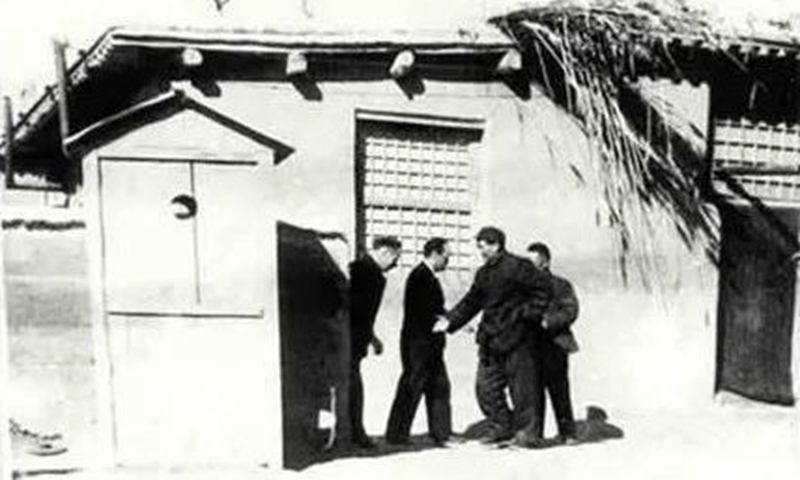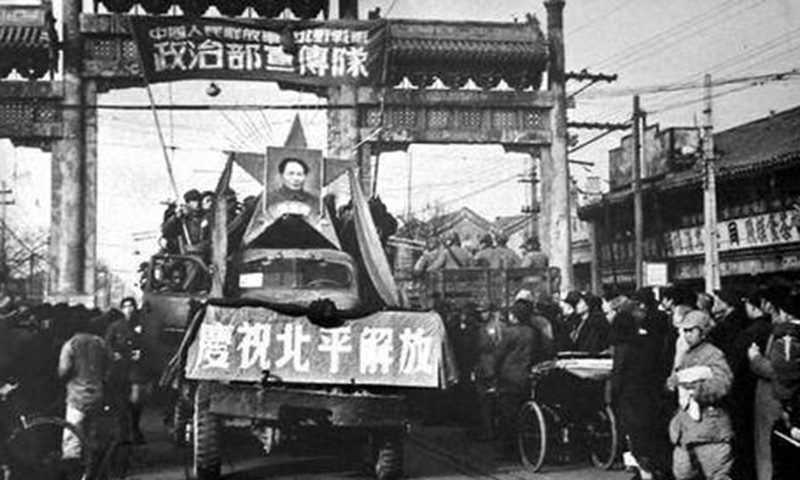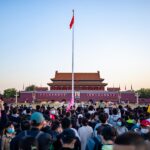From the Opium War when the United Kingdom broke open China’s gate with gunboats to the 1894 Sino-Japanese War and the signing of the Boxer Protocol, from the corrupt Qing Dynasty to the KMT government, imperialist powers imposed myriads of unequal treaties on China. They occupied the Chinese land, stationed troops, grabbed consular jurisdiction rights, controlled China’s customs and foreign trade, and monopolized China’s finance. These imperialist prerogatives and benefits had gravely undermined China’s independence, sovereignty and interests.
In January 1949, victories of the Liaoshen, Huaihai and Pingjin campaigns paved the way for the liberation across most regions in China. Then came an imperative task for the Chinese communist leaders: formulating the foreign policies of New China.

Mao Zedong Meets the Soviet Delegation Led by Anastas Mikoyan in Xibaipo
In January 1949, in his talks with Anastas Mikoyan, member of the Political Bureau of the Central Committee of the Communist Party of the Soviet Union, Mao Zedong characterized China’s foreign policy as “cleaning the house before inviting guests.” “If we are to compare China to a household, its house is way too messy, full of hay, dust, fleas, bedbugs, cooties and all other sorts of trash,” said Mao, “after the country is liberated, we must do some serious cleaning. We won’t invite guests to come over before the house is all clean and tidy and everything is in place. Our true friends may come earlier and help with the cleaning though, but other guests will have to wait for a longer while.”

This “cleaning” strategy was soon put into practice during the liberation of Beijing (then Peiping). Mao insisted that the progression of the People’s Liberation Army (PLA) go through Dongjiaominxiang, an alley occupied by foreign powers as a “state within state.” Mao referred to the alley as a scar on the face of the Chinese that must be peeled off.
Such a foreign policy reflected China’s resolve to renounce its history of humiliating diplomacy and particularly, to end all unequal treaties that gave imperialists their prerogatives in China.
Upon the founding of the People’s Republic of China in 1949, the CPC presided over the formulation of the Common Program of the Chinese People’s Political Consultative Conference, China’s provisional constitution. It stated that “the People’s Republic of China must abolish all the prerogatives of imperialist countries in China,” and that “the Central People’s Government of the People’s Republic of China shall examine the treaties and agreements concluded between the Kuomintang and foreign governments, and shall recognize, abrogate, revise, or re-negotiate them according to their respective contents.”
To review the old treaties concluded by the previous governments, Premier and Foreign Minister Zhou Enlai entrusted the Ministry of Foreign Affairs to set up the Committee of Treaties (now the Department of Treaty and Law of the Ministry). After reviewing, the Committee unanimously concluded that, apart from certain clauses on borders that needed further consideration, none of the treaties or agreements could be fully recognized or was worth revising for application.
On January 6, 1950, the Beijing Military Control Commission, the de facto authorities of the capital city, issued a proclamation, according to which all imperialist barracks must be retrieved and all buildings commissioned; the so-called “right to garrison” of foreign countries must be revoked and unequal treaties nullified; all foreign embassies must be evacuated within seven days.
Under such a situation, the then US “Consul General” O. Edmund Clubb at Beijing wrote a letter to Premier Zhou, claiming that the United States had been entitled to station troops in Dongjiaominxiang since the Boxer Protocol and that he hoped China would not take any action that violated US rights. The Ministry of Foreign Affairs dismissed him unequivocally in representations.
New China abolished all unequal treaties and imperialist prerogatives of the old China, making her a truly equal member of the international community and ushering in an era of China’s equal participation in international treaties. China has since signed its very first treaties with the DPRK and the USSR on the basis of equality and mutual benefit.
To date, China has concluded over 20,000 bilateral treaties and acceded to more than 500 multilateral treaties in various fields. Creative arrangements have been made on treaty-related issues that concern the return of Hong Kong and Macao. China is a country that delivers its words. Through concluding and acceding to treaties, China aims to safeguard the interests of the country and the people, enhance international friendship and cooperation, promote reform of the global governance system, safeguard the UN-centered international system and the international order underpinned by international law, and build a community with a shared future for mankind.
Mao Zedong Meets the Soviet Delegation Led by Anastas Mikoyan in Xibaipo


